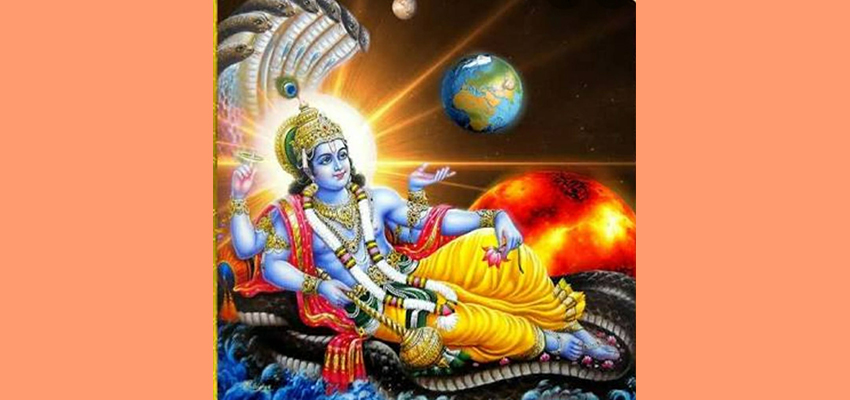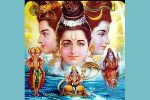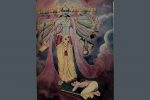NAME 24
Puruṣottamaḥ पुरुषोत्तमः
Puruṣottama means an excellent man. It can be split into Puruṣa + uttama. Puruṣa has already been discussed in nāma 14. Uttama means the highest. Therefore, Puruṣottamaḥ means the highest of puruṣa-s, the Supreme Soul or the Brahman.
Kṛṣṇa explains Puruṣottama in Bhagavad Gita (XV.18). “I am beyond the perishable matter of kṣetra, I am Superior to the imperishable soul; hence I am known as Puruṣottama.”
ŚvetāśvataraUpaniṣad (I.10) says, ‘the Cosmic Self (Puruṣottama) controls both the phenomenal world and the individual self. If you meditate on that Cosmic Self, māyā’s cosmic hold ceases and you are liberated.”
२४. || ॐ पुरुषोत्तमाय नमः ||
24. Puruṣottamay Namah
Purushottamah -The constitution of the individuality, Jeeva, when analysed, we find that it is made up of both the perishable-matter and the Imperishable-Spirit. The Spirit expressing through matter is the individuality, Jeeva. Reflected moon is the moon of the heavens dancing on the surface of water. Just as the moon is something different from its reflections and the water surfaces, so too the Self is, in its transcendental nature, something different from both matter, the perishable, and Spirit, the Imperishable, ever playing in matter. This Transcendental Truth is indicated by the term the Supreme Purusha (Purusha-uttama).
Being best among purusha is called as ‘puruShottama’. Here by pANiNisUtra 2.2.10 – ‘nanirdhAraNe’ – ‘ननिर्धारणे’ (a grammatical rule meaning ‘cannot be ascertained’), this word [puruShottama] does not talk about jAtI (caste), guNA (qualities) and kriyA (action). Hence it cannot be applied in relation to any community or in comparison with anyone or anything. When any quality or action of person stands out from the average mass or group or a particular community, it is called as ‘the best amongst community’.
INTERPRETATION GUIDED BY SANT VANI (WORDS OF SAINTS)
Puruṣhottamaḥ
The foremost, the exalted among men.
‘Puruṣottama’ is a special word. This is a samāsa, a compounding, that is allowed only in the case of ‘ uruṣottama.’ But, here ‘puruṣāṇāmuttamaḥ’ can be formed into a samāsa, because the Lord is not one among the group.
A small grammatical point here – In the English language, there are compound words such as tabletop( the top of a table), lion heart ( a brave person). Table top is neither the top nor the table but the top of the table. A lionheart is not a person who has had a heart transplant of a lion. It means a person who is brave. In Sanskrit too, words are compounded to indicate a specific meaning, the word being called a samāsa.
Puruṣottama is that ind of a compound word. In the case of ‘brāhmaṇānāmuttamah’ it cannot be combined to say ‘brāhmaṇottama.’ It remains as ‘brāhmanāṇāmuttamaḥ’ and stays without combining, because, compounds cannot be made with words which are :
a. jāti(group) e.g. a tree in a forest,
b. guṇa(attribute) e.g. the blue lily among all lilies,
c. kriyā(action) e.g. the one waving out to him in a crowd and
d. sambandha(relationship) e.g. son of the father.
But it is allowed in the case of ‘puruṣottama,’ because, other than the Lord, there is nothing else to compare Him with. Comparison is not possible. The Lord is uttama, superior, but not as one belonging to the class of men.
Since all that is here is the Lord, the Lord cannot be classified according to the group, he belongs to. Neither can the Lord be classified as having certain attributes and not the others, because all attributes of everything are a part of the order that is Bhagavan. Can some actions be classified as, of the Lord, and some not of the Lord? All actions possible in this world are a part of the laws and principles of physical sciences that is the Lord. Perhaps, the Lord can be classified by relationship then. No. The Lord escapes any and every categorization, because categorising limits the Lord! You may note that many of the category words one does use for Avatāras, as there is a form there.
In the Bhagavad Gitā, Bhagāvan says, ‘I am well nown in the world and in the Vedas as puruṣottama, because I am uttama, superior to the kṣara-puruṣa and the akṣara-puruṣa’ (15.18).
Sriṣṭi, the manifest creation, is called kṣara-puruṣa and the avyakta, the unmanifest, is called akṣarapuruṣa. He sustains both of them, but is neither of them. Therefore, He is superior to both of them, being the very adhiṣṭhana, the basis of both and hence is called Puruṣottama. Bhagavān is Puruṣottama being the Purusa, because of His all-pervasiveness, pūrṇatvāt, and Uttama, superior to all.
Verse 18.54 is another indication that, for the Gita, disappearance of the individual in a featureless Absolute is not the highest state but devotion to the Supreme Lord who combines in Himself the immobile and the mobile, and is the Purushottama.
SHRI KRISHNA PURUSHOTTAMA
“There is no one who knows more than the Lord Himself. No one is more worshipable or more mature a yogi than He. He is therefore the master of the Vedas, and to hear about Him always is the actual pleasure of the senses.”~Srimad Bhagavatam 3.25.2
Chapter 15
BHAGAVAD GITA
THE YOGA OF THE SUPREME SPIRIT
XV
Summary of Fifteenth Chapter.
This discourse is entitled “Purushottama Yoga” or the “Yoga of the Supreme Person”. Here Lord Krishna tells us about the ultimate source of this visible phenomenal universe from which all things have come into being, just like a great tree with all its roots, trunk, branches, twigs, leaves, flowers and fruits which spring forth from the earth, which itself supports the tree and in which it is rooted. Sri Krishna declares that the Supreme Being is the source of all existence, and refers allegorically to this universe as being like an inverted tree whose roots are in Para Brahman, and whose spreading branches and foliage constitute all the things and factors that go to make up this creation of variegated phenomena. This is a very mysterious “Tree” which is very difficult to understand, being a product of His inscrutable power of Maya; and hence a marvellous, apparent appearance without having actual reality. One who fully understands the nature of this Samsara-Tree goes beyond Maya. To be attached to it is to be caught in it. The surest way of transcending this Samsara or worldly life is by wielding the excellent weapon of dispassion and non-attachment.
In verses four and five of this discourse the Lord tells us how one goes beyond this visible Samsara and attains the supreme, imperishable status, attaining which one does not have to return to this mortal world of pain and death.
Lord Krishna also describes for us the wonderful mystery of His Presence in this universe and the supreme place He occupies in sustaining everything here. The Lord declares that it is a part of Himself that manifests here as the individual soul in each body. He Himself is the indwelling Oversoul beyond the self. He is the effulgence inherent in the sun, moon and fire. He is present as the nourishing element in the earth. He is the inner witness of all beings. He is the supreme Knower even beyond Vedic knowledge. He is the resplendent Person who is beyond both this perishable phenomenal creation as well as the imperishable individual soul which is a part of His eternal essence. Thus, because He is beyond perishable matter and superior to the imperishable soul (enveloped in Maya), He is known in this world as well as in the Vedas as the Supreme Person.
Sri BhagavaanUvaacha:
Oordhwamoolamadhahshaakhamashwatthampraahuravyayam;
Cchandaamsiyasyaparnaaniyastamvedasavedavit.
Oordhwamoolamadhahshaakhamashwa
tthampraahuravyayam;
Cchandaamsiyasyaparnaaniya
stamvedasavedavit.
The Blessed Lord said:
1. They (the wise) speak of the indestructible peepul tree, having its root above and branches below, whose leaves are the metres or hymns; he who knows it is a knower of the Vedas.
Adhashchordhwamprasritaastasyashaakhaah
Gunapravriddhaavishayapravaalaah;
Adhashchamoolaanyanusantataani
Karmaanubandheenimanushyaloke.
2. Below and above spread its branches, nourished by the Gunas; sense-objects are its buds; and below in the world of men stretch forth the roots, originating action.
Na roopamasyehatathopalabhyate
Naantonachaadirna cha sampratishthaa;
Ashwatthamenamsuviroodhamoolam
Asangashastrenadridhenacchittwaa.
3. Its form is not perceived here as such, neither its end nor its origin, nor its foundation nor resting place; having cut asunder this firmly-rooted peepul tree with the strong axe of non-attachment,
Tatahpadam tat parimaargitavyam
Yasmin gataananivartantibhooyah;
Tamevachaadyampurushamprapadye
Yatahpravrittihprasritaapuraanee.
4. Then that goal should be sought after, whither having gone none returns again. Seek refuge in that Primeval Purusha whence streamed forth the ancient activity or energy. That which fills the whole world with the form of Satchidananda, is Purusha. That which sleeps in this city of the body is the Purusha. Single-minded devotion, which consists of ceaselessly remembering the Supreme Being, is the surest and most potent means of attaining Self-realisation.
Nirmaanamohaajitasangadoshaa
Adhyaatmanityaavinivrittakaamaah;
Dwandwairvimuktaahsukhaduhkhasamjnair
Gacchantyamoodhaahpadamavyayam tat.
5. Free from pride and delusion, victorious over the evil of attachment, dwelling constantly in the Self, their desires having completely turned away, freed from the pairs of opposites known as pleasure and pain, the undeluded reach the eternal goal.
Na tadbhaasayatesooryonashashaangkonapaavakah;
Yadgatwaananivartantetaddhaamaparamam mama.
6. Neither doth the sun illumine there, nor the moon, nor the fire; having gone thither they return not; that is My supreme abode.
Mamaivaamshojeevalokejeevabhootahsanaatanah;
Manahshashthaaneendriyaaniprakritisthaanikarshati.
7. An eternal portion of Myself having become a living soul in the world of life, draws to (itself) the (five) senses with the mind for the sixth, abiding in Nature.
Shareeramyadavaapnotiyacchaapyutkraamateeshwarah;
Griheetwaitaanisamyaativaayurgandhaanivaashayaat.
8. When the Lord obtains a body and when He leaves it, He takes these and goes (with them) as the wind takes the scents from their seats (flowers, etc.).
Shrotramchakshuhsparshanam cha rasanamghraanameva cha;
Adhishthaayamanashchaayamvishayaanupasevate.
9. Presiding over the ear, the eye, touch, taste and smell, as well as the mind, he enjoys the objects of the senses.
Utkraamantamsthitamvaapibhunjaanamvaagunaanvitam;
Vimoodhaanaanupashyantipashyantijnaanachakshushah.
10. The deluded do not see Him who departs, stays and enjoys; but they who possess the eye of knowledge behold Him.
Yatantoyoginashchainampashyantyaatmanyavasthitam;
Yatanto’pyakritaatmaanonainampashyantyachetasah.
Yatantoyoginashchainampashyant
yaatmanyavasthitam;
Yatanto’pyakritaatmaanonainampashy
antyachetasah.
11. The Yogis striving (for perfection) behold Him dwelling in the Self; but, the unrefined and unintelligent, even though striving, see Him not.
Yadaadityagatamtejojagadbhaasayate’khilam;
Yacchandramasiyacchaagnautattejoviddhimaamakam.
Yacchandramasiyacchaagnautatte
joviddhimaamakam.
12. That light which residing in the sun, illumines the whole world, that which is in the moon and in the fire-know that light to be Mine.
Gaamaavishya cha bhootaanidhaarayaamyahamojasaa;
Pushnaamichaushadheehsarvaahsomobhootwaarasaatmakah.
Pushnaamichaushadheehsarvaahsomo
bhootwaarasaatmakah.
13. Permeating the earth I support all beings by (My) energy; and, having become the watery moon, I nourish all herbs.
Ahamvaishwaanarobhootwaapraaninaamdehamaashritah;
Praanaapaanasamaayuktahpachaamyannamchaturvidham.
Ahamvaishwaanarobhootwaapraaninaam
dehamaashritah;
Praanaapaanasamaayuktahpachaamyannam
chaturvidham.
14. Having become the fire Vaisvanara, I abide in the body of living beings and, associated with the Prana and Apana, digest the fourfold food.
Sarvasyachaahamhridisannivishto
Mattahsmritirjnaanamapohanam cha;
Vedaischasarvairahamevavedyo
Vedaantakridvedavidevachaaham.
15. And, I am seated in the hearts of all; from Me are memory, knowledge, as well as their absence. I am verily that which has to be known by all the Vedas; I am indeed the author of the Vedanta, and the knower of the Vedas am I.
Dwaavimaupurushau loke ksharashchaaksharaeva cha;
Ksharahsarvaanibhootaanikootastho’ksharauchyate.
Ksharahsarvaanibhootaanikootastho’
ksharauchyate.
16. Two Purushas there are in this world, the perishable and the imperishable. All beings are the perishable, and the Kutastha is called the imperishable.
Uttamahpurushastwanyahparamaatmetyudaahritah;
Yolokatrayamaavishyabibhartyavyayaishwarah.
Uttamahpurushastwanyahparamaatmet
yudaahritah;
Yolokatrayamaavishyabibhartya
vyayaishwarah.
17. But distinct is the Supreme Purusha called the highest Self, the indestructible Lord who, pervading the three worlds, sustains them.
Yasmaatksharamateeto’
hamaksharaadapichottamah;
Yasmaatksharamateeto’
hamaksharaadapichottamah;
Ato’smi loke vede cha prathitahpurushottamah.
18. As I transcend the perishable and am even higher than the imperishable, I amdeclared as the highest Purusha in the world and in the Vedas.
Yomaamevamasammoodhojaanaatipurushottamam;
Sa sarvavidbhajatimaamsarvabhaavenabhaarata.
Yomaamevamasammoodhojaanaati
purushottamam;
19. He who, undeluded, knows Me thus as the highest Purusha, he, knowing all, worships Me with his whole being (heart), O Arjuna!
Itiguhyatamamshaastramidamuktammayaa’nagha;
Etadbuddhwaabuddhimaansyaatkritakrityashchabhaarata.
Itiguhyatamamshaastramidamuktammayaa’
nagha;
Etadbuddhwaabuddhimaansyaatkritakrityash
chabhaarata.
20. Thus, this most secret science has been taught by Me, O sinless one! On knowing this, a man becomes wise, and all his duties are accomplished, O Arjuna!
Hari Om Tat Sat
ItiSrimadBhagavadgeetaasoopanishatsuBrahmavidyaayaam
ItiSrimadBhagavadgeetaasoopanishatsu
Brahmavidyaayaam
Yogashaastre Sri Krishnaarjunasamvaade
PurushottamayogoNaamaPanchadasho’dhyaayah
PurushottamayogoNaama
Panchadasho’dhyaayah
Thus in the Upanishads of the glorious Bhagavad Gita, the science of the Eternal, the scripture of Yoga, the dialogue between Sri Krishna and Arjuna, ends the fifteenth discourse entitled:
“The Yoga of the Supreme Spirit”
The Purusha in the title of the Purusha Sukta refers to the Parama Purusha, Purushottama, Narayana, in his form as the ViraaT Purusha. He was the source of all creation. It describes this form of his, as having countless heads, eyes, legs, manifested everywhere, and beyond the scope of any limited method of comprehension. All creation is but a fourth part of him. The rest is unmanifested.
Purusha as Brahma remained inactive, and Aniruddha Narayana, one of the four aspects of Narayana in the first tier at the base of the VishaakaYoopa, asked him “Why do you do nothing?” Because of not knowing, Brahma replied. “Perform a yajna. Your senses, the devas, shall be the ritviks. Your body shall be the havis. Your heart, the altar. And I shall be he who enjoys the havis — the offering. From your body sacrificed, shall you create bodies for all living creatures, as you have done in kalpas before this.” Thus says the sAkalyabrAmhaNA.
This yajna was called “Sarvahut”, the offering of all. The act of creation itself grew out of yajna, the rite of sacrifice. Who was worshipped at this sacrifice? It was the Purusha. Who performed it? Brahma, the creative aspect of the Purusha. Who were the ritvikpriests ? The devas, who are the Purusha’s senses. Who was tied as the beast of the sacrifice? Brahma, again. What was barhis, the altar of the sacrifice? All of nature. Who was the fire? The Purusha’s heart. What was sacrificed? Again, the Purusha himself, his great body that contained all of creation.
In a way, this is a message of love, that the Purusha would consume himself in the fire of creation, to create all the worlds. From this sacrifice did all of creation emanate. This is central to the message of the Purusha Sukta.
vedAhametampurushammahAntam
Aditya varNamtamasaHparastAt |
tam evamvidvAnamRtaihabhavati
naanyaHpanthAvidyate ‘yanaaya ||
This great Purusha, brilliant as the sun, who is beyond all darkness, I know him in my heart. Who knows the Purusha thus, attains immortality in this very birth.
I know of no other way to salvation.
In a way, this is a message of love, that the Purusha would consume himself in the fire of creation, to create all the worlds. From this sacrifice did all of creation emanate. This is central to the message of the Purusha Sukta.
vedAhametampurushammahAntam
Aditya varNamtamasaHparastAt |
tam evamvidvAnamRtaihabhavati
naanyaHpanthAvidyate ‘yanaaya ||
This great Purusha, brilliant as the sun, who is beyond all darkness, I know him in my heart. Who knows the Purusha thus, attains immortality in this very birth.
I know of no other way to salvation.



